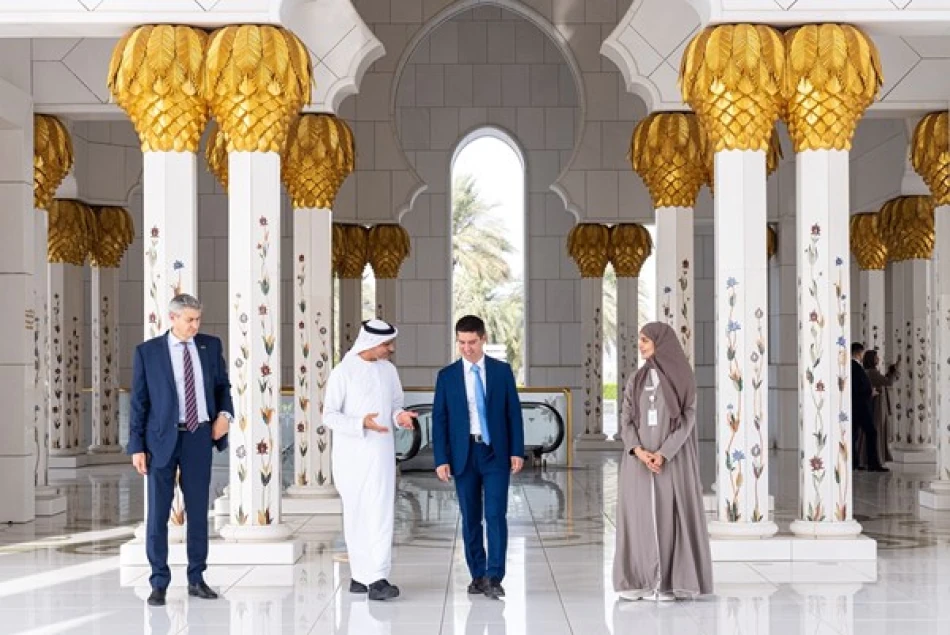
Moldovan Deputy PM Explores the Grandeur of Sheikh Zayed Grand Mosque in Abu Dhabi
Moldova's Deputy PM Explores UAE's Interfaith Diplomacy at Sheikh Zayed Grand Mosque
Moldova's Deputy Prime Minister and Foreign Minister Mihai Popsoi visited the Sheikh Zayed Grand Mosque in Abu Dhabi, highlighting the UAE's strategic use of cultural diplomacy to strengthen ties with Eastern European nations. The visit underscores how the Emirates leverages its architectural marvels and message of tolerance to build soft power relationships beyond traditional Gulf partnerships.
Cultural Bridge-Building Through Architecture
Accompanied by Moldova's Ambassador to the UAE Anatoli Vangeli and his delegation, Popsoi toured the mosque's halls and exterior corridors under the guidance of Dr. Youssef Al Obaidli, Director General of the Sheikh Zayed Grand Mosque Center. The visit focused on the mosque's civilizational message promoting coexistence, tolerance, and openness to others—values rooted in the UAE's founding father Sheikh Zayed bin Sultan Al Nahyan's legacy.
Cultural tour specialist Shaima Al Kindi provided detailed explanations of the mosque's aesthetic beauty and the diverse Islamic architectural arts displayed throughout the complex. The mosque showcases unique artifacts and represents centuries of Islamic civilization, with various artistic and architectural designs converging to reflect the harmonious integration of different cultures in a single creative masterpiece.
Strategic Soft Power in Action
The UAE's approach mirrors successful cultural diplomacy strategies employed by other nations seeking to expand their global influence. Similar to how Singapore uses its Gardens by the Bay or how France leverages the Louvre, the Emirates has transformed the Sheikh Zayed Grand Mosque into a powerful tool for international relationship-building.
This visit comes at a time when Moldova, positioned between EU aspirations and regional pressures, is diversifying its diplomatic partnerships. The country's leadership appears increasingly interested in exploring economic and cultural ties with Gulf states, particularly as European energy security concerns have highlighted the importance of alternative partnerships.
Beyond Tourism: Economic Implications
For investors and diplomatic observers, such high-level cultural exchanges often precede more substantial economic agreements. The UAE has successfully used similar mosque visits by foreign dignitaries as stepping stones to trade deals, investment partnerships, and diplomatic cooperation agreements.
The delegation's visit to Sheikh Zayed's tomb and the presentation of the book "Sheikh Zayed Grand Mosque: The Flow of Peace" represents more than ceremonial courtesy. These gestures are calculated diplomatic moves designed to create lasting impressions and establish personal connections that facilitate future negotiations.
Regional Context and Future Prospects
Moldova's engagement with the UAE reflects broader trends in Eastern European diplomacy, where smaller nations are increasingly looking beyond traditional European partnerships. The timing is particularly significant given Moldova's ongoing challenges with energy security and economic development.
The mosque visit, while seemingly ceremonial, represents the UAE's methodical approach to expanding its diplomatic footprint in regions where it previously had limited influence. This strategy has proven successful across Africa, Asia, and now appears to be extending into Eastern Europe, positioning the Emirates as a global diplomatic player rather than merely a regional Gulf power.
Most Viewed News

 Layla Al Mansoori
Layla Al Mansoori






